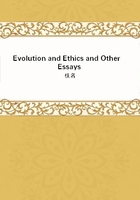
第39章
THE first act of a new-born child is to draw a deep breath. In fact, it will never draw a deeper, inasmuch as the passages and chambers of the lungs, once distended with air, do not empty themselves again; it is only a fraction of their contents which passes in and out with the flow and the ebb of the respiratory tide. Mechanically, this act of drawing breath, or inspiration, is of the same nature as that by which the handles of a bellows are separated, in order to fill the bellows with air; and, in like manner, it involves that expenditure of energy which we call exertion, or work, or labour. It is, therefore, no mere metaphor to say that man is destined to a life of toil: the work of respiration which began with his first breath ends only with his last; nor does one born in the purple get off with a lighter task than the child who first sees light under a hedge.
How is it that the new-born infant is enabled to perform this first instalment of the sentence of life-long labour which no man may escape? Whatever else a child may be, in respect of this particular question, it is a complicated piece of mechanism, built up out of materials supplied by its mother; and in the course of such building-up, provided with a set of motors--the muscles. Each of these muscles contains a stock of substance capable of yielding energy under certain conditions, one of which is a change of state in the nerve fibres connected with it. The powder in a loaded gun is such another stock of substance capable of yielding energy in consequence of a change of state in the mechanism of the lock, which intervenes between the finger of the man who pulls the trigger and the cartridge. If that change is brought about, the potential energy of the powder passes suddenly into actual energy, and does the work of propelling the bullet. The powder, therefore, may be appropriately called work-stuff, not only because it is stuff which is easily made to yield work in the physical sense, but because a good deal of work in the economical sense has contributed to its production. Labour was necessary to collect, transport, and purify the raw sulphur and saltpetre; to cut wood and convert it into powdered charcoal; to mix these ingredients in the right proportions; to give the mixture the proper grain, and so on.
The powder once formed part of the stock, or capital, of a powder-maker: and it is not only certain natural bodies which are collected and stored in the gunpowder, but the labour bestowed on the operations mentioned may be figuratively said to be incorporated in it.
In principle, the work-stuff stored in the muscles of the new-born child is comparable to that stored in the gun-barrel. The infant is launched into altogether new surroundings; and these operate through the mechanism of the nervous machinery, with the result that the potential energy of some of the work-stuff in the muscles which bring about inspiration is suddenly converted into actual energy; and this, operating through the mechanism of the respiratory apparatus, gives rise to an act of inspiration. As the bullet is propelled by the "going off" of the powder, as it might be said that the ribs are raised and the midriff depressed by the "going off" of certain portions of muscular work-stuff. This work-stuff is part of a stock or capital of that commodity stored up in the child's organism before birth, at the expense of the mother; and the mother has made good her expenditure by drawing upon the capital of food-stuffs which furnished her daily maintenance.
Under these circumstances, it does not appear to me to be open to doubt that the primary act of outward labour in the series which necessarily accompany the life of man is dependent upon the pre-existence of a stock of material which is not only of use to him, but which is disposed in such a manner as to be utilisable with facility. And I further imagine that the propriety of the application of the term 'capital' to this stock of useful substance cannot be justly called in question; inasmuch as it is easy to prove that the essential constituents of the work-stuff accumulated in the child's muscles have merely been transferred from the store of food-stuffs, which everybody admits to be capital, by means of the maternal organism to that of the child, in which they are again deposited to await use. Every subsequent act of labour, in like manner, involves an equivalent consumption of the child's store of work-stuff--its vital capital; and one of the main objects of the process of breathing is to get rid of some of the effects of that consumption. It follows, then, that, even if no other than the respiratory work were going on in the organism, the capital of work-stuff, which the child brought with it into the world, must sooner or later be used up, and the movements of breathing must come to an end; just as the see-saw of the piston of a steam-engine stops when the coal in the fireplace has burnt away.